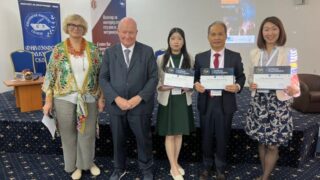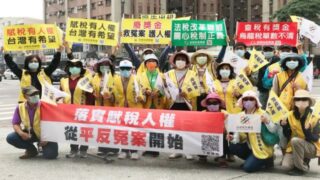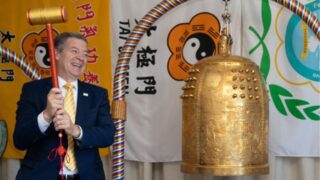Controlling the youth is a common feature of all totalitarian regimes. To show it is a real democracy, Taiwan should solve the Tai Ji Men case.
by Marco Respinti*
*A paper presented at the hybrid seminar “The Stolen Youth of Tai Ji Men,” co-organized by CESNUR and Human Rights Without Frontiers on August 8, 2022, in Walnut, California, in sight of the UN International Youth Day of August 12.


Youth is the best age in life. It is the spring of hope and the blossoming of opportunities. Maturity is the age of wisdom only if it retains the sprinkle of youth within itself. Senility is not just withering old only if it serves to guide what Anglo-American poet T. S. Eliot (1888–1965) and his American disciple Russell Kirk (1918–1994) used to call “the rising generation.”
We all admire youth, but sadly youth is sometimes wasted. It is dissipated when it is lived with no purpose and no perspective. It is misused when it is not grabbed and held, but merely let pass. It is useless when it doesn’t bear fruit. It is so common to regret youth once we have become old; and it is so miserable to repent of a wasted youth once it is gone forever. The best wish we can make to young people is never to repent for not having lived a full youth. The best desire we can have for them is never to rue a youth wasted either in idleness or vice. All this depend on ourselves. We may not be wise enough to see it when we are young, but it is always our responsibility to face our life. Nobody else should be blamed if time for us remained only time, not developing in experience and not growing as sagacity.
Yet another danger threatens youth, and it comes not from within but from without. It is when young people are robbed of that spring, that sparkle, and that blossoming that is their youth. When they are compelled to grow too fast. When their experience of the world becomes a mere strategy for survival in a hostile environment. In a word, when they are blatantly stolen their youth.
This is what happened to an entire generation of Taiwanese citizens, whose only fault was to belong to the peaceful spiritual movement called Tai Ji Men.
Tai Ji Men at the center of history
A “generation” is a unit of time measurement used since antiquity. It is time measured by the link between parents and children. It is, thus, the most basic unit for measuring historical time. In fact, history is time considered by a subject who has conscience of its flowing. History is a peculiar human notion and feature. While the whole universe lives in history, only human beings have conscience of living in a flowing and purposeful time, making history. Generations, with their passing of a heritage, are then the peculiar place where history is made.


Conscience is thus the center of history. With no conscience, there is no history, but only the dull passing of time without understanding it is passing. Tai Ji Men has put this concept at the center of its reflection and events. On January 1, 2014, the Federation of World Peace and Love (FOWPAL), the Association of World Citizens (AWC), and the Tai Ji Men Qigong Academy jointly promulgated the movement called “An Era of Conscience.” Its basic tenet is that “Everyone is the leader and guide of his/her own conscience.” This is precisely what is needed to make history.
Sociologists and historians consider a “generation” a group of people living in the same portion of time, as actors and subjects of the same events. A “generation” is generally considered to be a span of 20–30 years, i.e. the time needed to allow new human beings to be born and raised and become adult. If a generation is calculated to be 20–30 years, a period of 25 years is right at the center of this notion. We all know that the Tai Ji Men movement is at the center of a persecution that has been lasting for more than 25 years, for more than a quarter of a century, meaning an entire generation. An entire generation was spent in persecution. An entire group of young people, whose youth has been denied its proper features and role. This is a wasted generation. In a sorrowful way, Tai Ji Men is making history and is at the center of history.
Stealing youth
Stealing youth is a feature of all totalitarian regimes, where ideologies produce ideocracies. In fact, totalitarian states always claim to know better than their citizens. They constantly try to manipulate the conscience of their youth. Examples are all too numerous, and all too sad.
The Soviet Union created the All-Union Leninist Young Communist League, known as “Komsomol.” It was a mass organization regarded as the youth division of the Communist Party of the Soviet Union. It was created as early as 1918, showing the great interest of the Soviet state in educating young people to make them grow as perfect Communist citizens, away from the “nefarious” influence of their families. The Komsomol was organized in three different stages, for young people from the age of 5 up to 28.
On the same model, Nazi Germany created the Hitlerjugend, or Hitler Youth. Its very name manifested the cult of personality that obsessed that regime and affirmed the idea of a state exerting total control on the youth. It was created in 1922, four years after the Soviet Komsomol and it was the only allowed boys’ organization in Germany until the very fall of the regime and the death of Adolf Hitler (1889–1945) in the Spring of 1945. It gathered young males in two different groups, from the age of 10 to 18.


Of course, also Communist China has its own totalitarian form of control of the youth. The Chinese Communist Party’s organization for the youth is called Young Pioneers of China and, contrary to what happened to similar organizations in the Soviet Union and the Third Reich, it still exists, since totalitarianism in the People’s Republic of China has not yet been swept away. This CCP’s mass organization gather all young from the age of 6 to 14, and it is run by the Communist Youth League.
Let me briefly mention the case of Fascism in Italy. Contrary to what it is often told uncritically, Italian Fascism differed from Nazism in Germany and the Communist regimes because it was not fully totalitarian. It displayed many features of a totalitarian regime but was not able to reach a full totalitarian autarchy, as much as it wanted too. This of course does not go to the credit of the Fascist regime. It was due to some cultural and social forces rooted in Italian society, which managed to contain the regime. They were mainly the Catholic Church and the monarchy of the House of Savoy, even if Fascism in turn tried to control them and limit their action.
One of the spheres where the antagonism between the Catholic Church and the Fascist regime was more obvious was the education of youth. The contest was won by the Church, and this is a spectacular example of a field where Italian fascism wanted to become fully totalitarian but did not manage to achieve this result. In the Concordat signed by the Vatican and the Italian state in 1929, it was clearly stated that the families and the Catholic Church had a primary right to educating children, an activity that was not a monopoly of the state. Not surprisingly, the Fascist regime did try to tamper with the agreement, but, thanks to the firm opposition of the Catholic Church, the damages it was able to do to education remained limited.


Thinking of what an entire generation of Taiwanese citizen, Tai Ji Men dizi, was compelled to suffer because of the inflexible, tyrannical, and cynical attitude of some corrupt bureaucrat, I was reminded of these totalitarian attempts to control the youth of an entire country.
Many Tai Ji Men dizi were born in persecution, grew in persecution, became adult in persecution. Many of them have experienced nothing else than persecution. For a democratic society, allied of the democratic West in counteracting the misdeeds of totalitarian and tyrannical countries in a delicate region of the world, this is frankly too much.
Taiwan is under siege since more than 60 years by a regional and international power that kidnapped its own youth to impose them an inhumane ideology. Taiwan is now living crucial hours. It should immediately look at its own youth, and set it free. It should immediately free Tai Ji Men dizi of the consequences of old false accusations, and let its youth be the hope of the future again. Unfortunately, for too many of them it is too late. No one may give back to them what was stolen. The only possible reparation is to stop repeating the same errors again, and publicly apologize for a stolen youth.


Let me conclude with a personal wish, by using some verses from a beautiful poem called Mia giovinezza, “My Youth,” from Italian poet Ada Negri (1870–1945):
“I have not lost you. You remained, at the bottom
Of being. It is you, but another you are:
Without leaf nor flower, without the shining
Laughter you had at the time that does not return,
without that song. Another you are, more beautiful.
[…]
O timeless youth, O ever
renewed hope, I commit thee
To those who are to come: until on earth
Spring blooms again, and in the sky
The stars are born when the sun is extinguished.”









